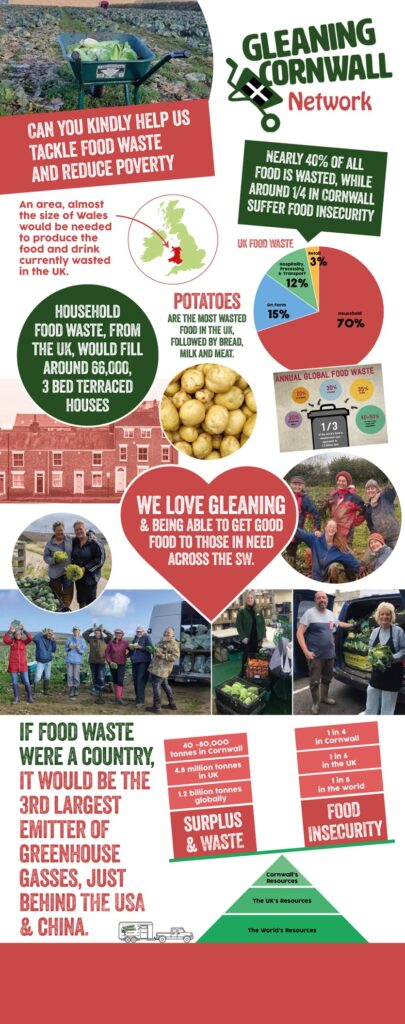Holly Whitelaw – Founder of Gleaning Cornwall
One of the problems Gleaning Cornwall is helping to address, is food waste. Farmers, through no fault of their own, often can’t harvest all their crops or it is the wrong size, shape or colour for them to be able to sell. Once they understand what we do and why, we have found that farmers are more than happy to donate such produce, knowing it will be used by those who need it most.
Though the majority of food waste comes from our homes, 15-18% comes from on farms, with retail, transport and processing combined, making up the other 15% percent. We manage to reduce this in Cornwall by around 80 tonnes a year and promote the food waste issue as widely as possible through talks, presentations and events.
The Hidden Waste report published, shows the substantial environmental footprint of on-farm food waste, which accounts for around 10% of greenhouse gas emissions from UK farming. In terms of wasted natural resources, producing this food requires an area of land nearly half the size of Wales.
Given the scale of estimated food waste on UK farms, which has historically been excluded from industry and government data, WWF and Tesco are calling for urgent action from UK governments and food businesses to ensure greater transparency around on-farm food waste and to support farmers in tackling this “hidden” crisis.
Kate Norgrove, Executive Director of Advocacy and Campaigns at WWF, said:
“At a time when people up and down the country are struggling to put food on the table it is unfathomable that millions of tonnes of food is going to waste on UK farms each year. This hidden crisis shows why we need urgent action to fix our broken food system.
“Given the cascade of benefits that tackling food waste on farms could bring – from bolstering our food security to helping address the climate crisis – UK Government and businesses across the food sector must take urgent action to support farmers in slashing food loss and waste on farms, as part of wider efforts to drive down waste across the food system.
“At the same time, ministers must reaffirm the Government’s commitment to incentives that will drive a UK-wide shift to nature friendly farming, helping to futureproof our food system and bring our world back to life.”
Sarah Bradbury, Quality Director at Tesco, said:
“It’s completely unacceptable that good food goes to waste, and never more so than at a time when families face rising costs and far too many people are struggling to put food on the table. It’s why we’ve worked hard to tackle the issue of food waste in our own business, recently announcing that we will accelerate our plans to halve food waste in our own operations by 2025, five years ahead of our original goal.
“We want to support our farmers and suppliers to do the same, encouraging them to Target, Measure, Act and follow the lead of 107 of our suppliers who have collectively cut food loss and waste by 78,000 tonnes.
“Today’s report by the Tesco-WWF partnership plays a critical role in shining a light on hidden food waste. With ongoing environmental and economic challenges affecting the food system, we hope it will challenge our industry to understand the underlying drivers of on-farm waste and help us to work together to resolve it.”
The Courtauld Commitment 2030 is the UK’s voluntary agreement enabling collaborative
action across the entire food chain to deliver farm-to-fork reductions in food waste,
greenhouse gas (GHG) emissions and water stress. Its targets for 2030 are:
• 50% reduction in food waste arising across the UK (post-farm-gate) per person by
2030, in line with the United Nation’s Sustainable Development Goal (SDG) 12.3,
against a 2007 baseline.
• 50% absolute reduction in GHG emissions associated with food and drink consumed
in the UK against a 2015 baseline.
• 50% of fresh food is sourced from areas with sustainable water management.

